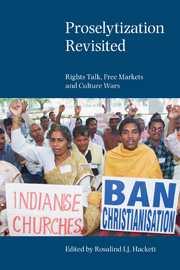Book contents
- Frontmatter
- Contents
- Preface and acknowledgements
- Contributors
- Revisiting Proselytization in the Context of Rights Talk, Free Markets and Culture Wars
- Section I
- Section II
- Section III
- Section IV
- Negotiating Proselytism in 21st Century Russia
- Between Da'wa and Mission: Turkish Islamic Movements in the Turkic World (Central Asia and the Caucasus)
- Siritual Wars in the 10-40 Window: Korean Proselytism among Russia's Asian Minorities
- Section V
- Index
Negotiating Proselytism in 21st Century Russia
from Section IV
- Frontmatter
- Contents
- Preface and acknowledgements
- Contributors
- Revisiting Proselytization in the Context of Rights Talk, Free Markets and Culture Wars
- Section I
- Section II
- Section III
- Section IV
- Negotiating Proselytism in 21st Century Russia
- Between Da'wa and Mission: Turkish Islamic Movements in the Turkic World (Central Asia and the Caucasus)
- Siritual Wars in the 10-40 Window: Korean Proselytism among Russia's Asian Minorities
- Section V
- Index
Summary
Debating the issue of proselytism is quite new in Russia. Moreover, the term was virtually unknown prior to the 1990s. Since that time, significant changes in public discourse have taken place. In order to comprehend the significance of contemporary debates on the subject it is necessary to situate the problem of proselytization in historical perspective, as well as to distinguish its theological, cultural, social, and political aspects. Furthermore, Russia's traditional non-Christian denominations, which are found predominantly within certain ethnic groups, have not yet felt the full impact of proselytism. For this reason, this chapter will focus primarily on the Christian segment of Russia's religious landscape. There will be some examination of the key terms in this debate, as well as the various understandings of the nature and the tasks of missionary activity by the various parties involved.
The influx of multiple new denominations into Russia in the 1990s, and the attendant rise in proselytizing activity, attracted the attention of religious figures, academics, policy makers and the mass media in Russia. It also provoked scholarly interest abroad. For example, Emory Law School's, Law and Religion Program, Proselytism Project published a volume entitled, “Proselytism and Orthodoxy in Russia: The New War for Souls” (Witte and Bourdeaux 1999). I will refer to the contents of this book in my analysis, especially when covering the divergent views that each denomination holds concerning evangelism, missionary work, and proselytism.
- Type
- Chapter
- Information
- Proselytization RevisitedRights Talk, Free Markets and Culture Wars, pp. 339 - 364Publisher: Acumen PublishingPrint publication year: 2008



